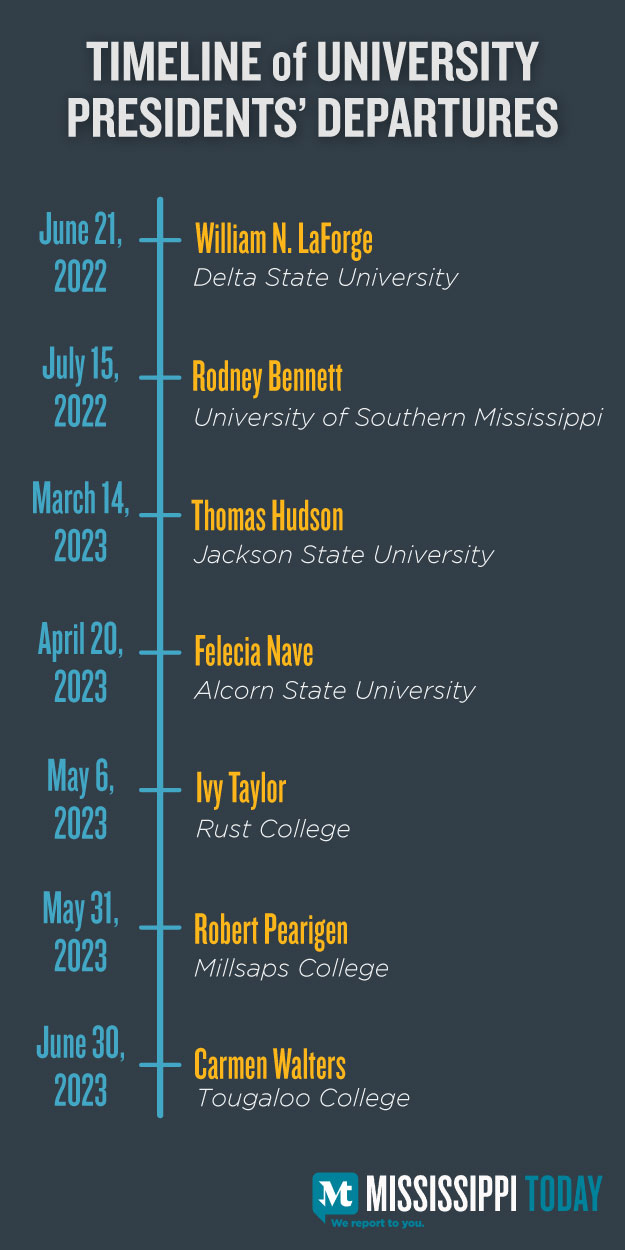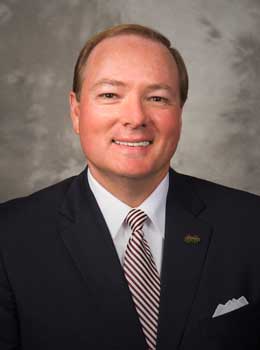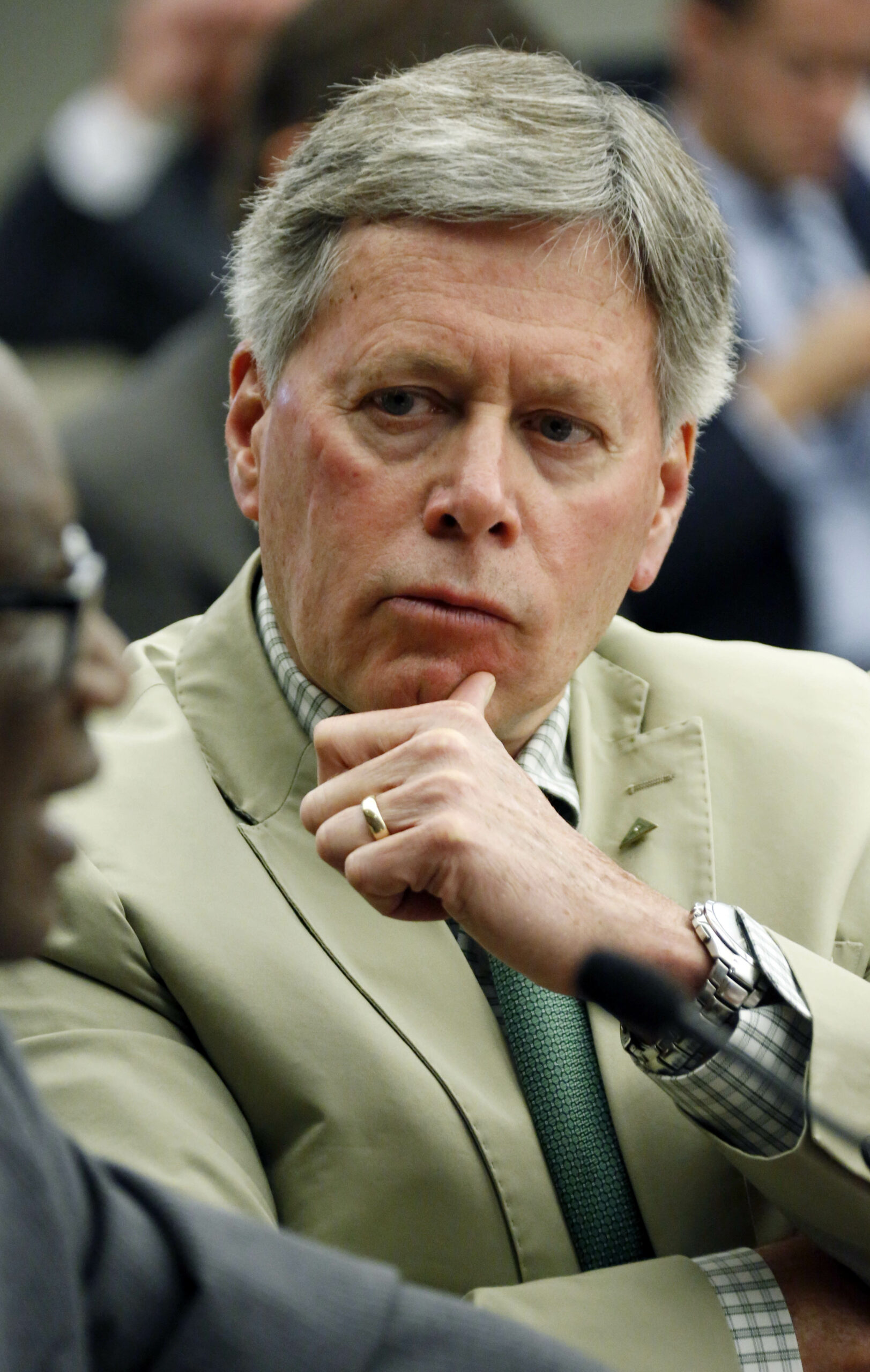Mississippi Today
7 university presidents have left in the last year. Why is turnover so high?


William LaForge — the former Delta State University president who was suddenly fired last summer — wants you to know this is not about “sour grapes.”
The regional public college he led for nine years in Cleveland, a small town in the Mississippi Delta, was losing students. There was a 27% decline in enrollment during the pandemic. He feuded with faculty. The school’s cash-on-hand, a financial health metric, was dwindling. And clashes with local donors over the golf course he closed sowed division.
LaForge concedes all of that. But if the Institutions of Higher Learning Board of Trustees had to fire him, he said there was a better way to do it.
Though the board gave LaForge a few weeks heads up it was considering parting ways, he says he did not learn he was officially fired until the commissioner, Alfred Rankins, called him on Monday, June 20, five minutes before a press release published announcing the decision.
“The way they did this gave Delta State an unnecessary black eye at a particularly vulnerable time,” he said. “I resent that.”
The stunning termination was the first in a series of presidential turnovers that have roiled colleges and universities in Mississippi over the last year. Weeks after LaForge was canned in 2022, Rodney Bennett, the president of the University of Southern Mississippi, stepped down in July — nearly a year before he said he would. Earlier this year, Thomas Hudson at Jackson State University resigned after the board placed him on administrative leave with pay. Then Felecia Nave was terminated from Alcorn State University.
All this has left students, faculty and staff and alumni wondering: Why is this happening? Mississippi Today spoke with more than a half-dozen former IHL board members, university administrators and faculty to understand the causes.
It’s unusual that LaForge — or for that matter, any president — was fired at all, some trustees said. Even presidents whose tenure ended in scandal have been allowed to step down. William Bynum Jr., the former Jackson State president who was arrested in a prostitution sting in 2020, resigned.
IHL acknowledged the board prefers presidents to resign in a written statement to Mississippi Today.
“That is common among employers,” IHL wrote. “No one wants to have to terminate an employee.”
The board added it could not comment on LaForge’s specific personnel matter.

The state’s private colleges haven’t been immune from turnover either. Millsaps College, Rust College and Tougaloo College have all seen their presidents depart in the last six months. The latter two are both historically Black universities, which have been especially impacted by turnover.
“It puts the university in maintenance mode,” said Dan Durkin, a University of Mississippi professor and the president of the United Faculty Senate Association of Mississippi.
As far as LaForge knows, “there’s been nothing like this exodus in the near past, in my lifetime.”
He feels like his longer-than-average tenure has been overshadowed by its bitter end. Now, a year after he was fired, he has a warning for university presidents in Mississippi: “Watch your back.”
“Future presidents should know it’s not forever,” he told Mississippi Today in a phone call from Virginia, where he has retired. “And you should know it’s not on your terms.”
Skirting a unified theory of turnover, some trustees said there are likely as many reasons for the recent turnover as there are departed presidents.
Others said it’s more general than that. But everyone agreed the job is getting harder, especially for the presidents of the smaller institutions. Wooing private donors matters much more in a time of declining state appropriations. So does enrollment. The eight universities are vying for the same pool of high school graduates, and University of Mississippi and Mississippi State, with their deep pockets and big stadiums, can out-compete them all.
“Many factors make the role of university president a complex and challenging position,” IHL wrote in a statement to Mississippi Today.
Ford Dye, a surgeon who was appointed to the IHL board by former Gov. Phil Bryant in 2012, said that turnover isn’t just an IHL or Mississippi issue. It’s a national problem.
Research backs him up. Across the country, university presidents are serving shorter terms than ever. According to the latest survey by the American Council on Education, a typical university president has served for 5.9 years. A majority don’t think another five years is possible due to the pandemic and the politicization of higher education.
That holds true for Mississippi, former trustees said.
“I agree with that,” said Bill Crawford, who served on the board from 1992 to 2004, when asked if the job of a university president in Mississippi has gotten more political. “What hasn’t?”
Presidents must wrangle so many constituencies on campus that even if they aren’t fired, frustrated faculty or outspoken alumni could drive them to quit. For leaders of the HBCUs, this presents a particularly fraught dynamic. In his autobiography, John Peoples, the beloved former Jackson State president, described walking a fine line between pleasing the mainly white board and advocating for his school. Another long-serving Jackson State president, Ronald Mason, resigned in 2010 in part due to outcry that he supported an IHL-backed plan to merge the three HBCUs.
“Navigating competing priorities and demands is one of the reasons the job is so difficult,” IHL wrote.
The presidents who thrive in this environment, trustees said, are politically savvy.That’s why Mark Keenum, Mississippi State University’s president, has lasted so long. (For LaForge, this is particularly ironic, as just like Keenum, he got his start in Thad Cochran’s office.)

Keenum invites board members and lawmakers to sporting events and remembers the names of their family members, former trustees told Mississippi Today. His 14-year tenure as the president of Mississippi State University makes him the longest currently serving president and the exception to the rule.
“Mark is an intense listener,” said Sid Salter, Mississippi State’s director of public affairs. “He is, by nature, kind and thoughtful.”
Then there’s the view that the issue of turnover starts at the top — with the 12 trustees who are appointed by the governor to lead the system, a job that includes picking the university presidents.
“That is a matter of opinion,” IHL wrote. “Every personnel situation is different.”
That is also LaForge’s perspective.
He said his experience shows that when the going gets tough, this crop of IHL trustees lets the presidents go. Their four-year contracts are at-will. And the commissioner, Alfred Rankins, the presidents’ manager, is not standing up for them, LaForge said.
“I have grave concerns, and I know others do too, but they would never go public,” LaForge said. “Some of them are university heads.”
Past trustees were more understanding of the pressures that presidents face, he said.
Around the time he was appointed in 2013, LaForge spoke with Alan Perry, a trustee, and Hank Bounds, the then-commissioner. They warned LaForge that even though he should try to increase enrollment, it would be a serious challenge due to many factors, including the depopulation of the Delta.
“I took offense to that,” LaForge said.
But he said that they told him, “It’s not just you. It can’t be done. There are external factors beyond human capacity.”
Bounds told Mississippi Today he recalled the meeting. Perry wrote in an email that he did not remember this but in general had many discussions about the difficult task of increasing Delta State’s enrollment and thought LaForge was recalling those.
Nine years later, declining enrollment was one of the putative reasons for his firing, LaForge said. It is the number one metric on a list of 20 that university presidents are now graded on, according to the evaluation criteria obtained by Mississippi Today.
The IHL board, which can in nearly all cases hire or fire its eight university presidents at the whim of a majority vote, is a jumble of contradictions. It was created to be insulated from politics, but board members are political appointees. The board has been dogged by accusations of favoritism, but trustees are supposed to check their school colors at the door.
Some trustees like to say that “running a university is like running a city,” said C.D. Smith, an AT&T regional director who was appointed by Gov. Haley Barbour in 2008 and served until 2018.
Unlike a city, there is little democracy at the universities — and none at all within IHL.
The board knows that. Increasingly, Smith said, trustees think of the university presidents as CEOs who can be hired or fired “as the circumstances require.” The commissioner is a middle-manager who meets weekly with the presidents, who are his direct reports, and conducts their biennial performance reviews.
All this goes against the expectation many faculty have, which is of “shared governance,” a way of viewing the university as a partnership between students, faculty, staff and a transparent administration.
Trustees are aware of that too. When Crawford sat on the board, he said that any time a president had to be removed, trustees faced a tug-of-war between sharing just enough information to ameliorate upset alumni but not so much that it would denigrate a reputation — or lead to an employment lawsuit. He said the board also wants to make Mississippi a “congenial” place to be a college president.
“To the extent that you can comment, you offer a reason for making the change,” Crawford said. “But what you want to do is not harm somebody’s career by talking about those sorts of things which are personnel matters oftentimes.”
IHL wrote that the board “recognizes that all employees are entitled to confidentiality in personnel matters.”
In recent years, the board has said less and less, offering little-to-no information about its decisions and spurring calls for accountability from alumni, particularly from Alcorn State and Jackson State.
READ MORE: ‘Stop hiring your friends’: JSU community speaks up in listening session for next president
Just as trustees were not engaging with the community, it seemed to LaForge like they could do more to support the funding needs of each university.
The commissioner, legislative liaisons and lobbyists all advocate for funding during the legislative sessions, and IHL wrote that individual trustees “may, and do” advocate for the board’s requests.
But a few years after Rankins was appointed in 2018, LaForge recalled that he and some of the other presidents asked the commissioner if trustees could help lobby for more state funding at the Capitol, considering many of them donated to lawmakers. That could alleviate some of the pressure that presidents face to fundraise, he said.
The suggestion seemed to go nowhere, LaForge said.
On June 7 last year, LaForge said he received a personal visit from Rankins and IHL’s legal counsel. They met in the conference room in Kent Wyatt Hall. There, LaForge said the commissioner informed him that trustees were considering ending his contract at the upcoming board meeting on June 16 — news that LaForge recalled Rankins acknowledging was “a punch in the gut for you.”

The commissioner offered LaForge several options to resign, including staying on at Delta State to research how to bring more students to campus or increase faculty retention — a proposal that LaForge considered “frankly garbage.”
“Why the hell would I stay around Cleveland on campus doing research when that’s supposed to be done by somebody else on my campus anyway,” LaForge said he thought at the time.
He rejected all the options to resign. Then he said he asked Rankins what advice the commissioner had given the board on whether to fire him. LaForge said Rankins told him he gave the board no advice.
“He is supposed to support his presidents, that’s part of his job,” LaForge said. “I didn’t get the feeling he did that (for me) and nor do others.”
In a statement to Mississippi Today responding to LaForge’s recollection of the June 7 visit, IHL said the commissioner does not make a “recommendation regarding continued employment” of a president when he presents performance reviews to the board.
In the IHL board room later that month, the vibe was “cordial but cold,” LaForge recalled. Sitting in front of the trustees during executive session, he made his case.
He wasn’t trying to save his job. He just wanted to stay at Delta State through the end of his contract in 2023 to “make it a smooth, orderly transition.” He said he thought that was the deal trustees had given Rodney Bennett, the then-president of USM, who was also appointed in 2013.
“That’s what you did for Rodney, at least do it for me,” he said he told the board.
Mississippi Today could not confirm any sort of “deal” took place and while many outlets, including this one, reported Bennett stepped down before he initially said he would, no articles detailed some sort of compromise between the former USM president and the IHL board.
Four days later, the termination letter came. It was labeled “personal and confidential” and signed by Rankins. It listed no reason for LaForge’s firing and noted he would be paid by the board through June 2023, the original end of his contract.
IHL meeting minutes show that in the same executive session, trustees also voted to terminate Bennett’s contract and name Joe Paul interim president at USM. IHL wrote that the termination of Bennett and LaForge’s contracts were unrelated.
Delta State had consistent leadership up until LaForge’s firing. Now he spends his time exercising, running errands for his kids and contemplating creating a Wikipedia page.
He said he wishes his successor, Daniel Ennis, well. But he worries for the future of the system. So do many students, faculty and alumni.
Take Jackson State University which, along with the two other public HBCUs, has had more presidential turnover in the last two decades than the predominantly white institutions. Its community has repeatedly asked the board to conduct a more transparent search.
But as Keenum’s success has shown, closed searches aren’t the be all, end all. He was confirmed following a search that was unusually secretive for its time.
The Legislature could make a change to the board, Crawford said, through the constitutional amendment process. Without a ballot initiative process, the public has no direct avenue to influence IHL. In a statement, IHL said the board “regularly listens to input and concerns from constituents and tries to be responsive within the parameters of its constitutional duty.”
But recent bills to dissolve IHL have failed. And lawmakers may not view turnover as IHL’s fault. Sen. Hillman Frazier, a Democrat who represents parts of Jackson, said at a listening session in April for the Jackson State presidential search that he has heard lawmakers cite the university’s turnover as a reason not to provide it with more funding.
Presidential turnover, LaForge said, is just like enrollment. The three largest and wealthiest universities in Mississippi will be just fine; if they wanted to buy the entire freshman class, LaForge said, they could do it, and leave the smaller schools scrambling.
“It’s just like how the rich get richer,” he said. “I’m not bemoaning it. It’s a fact.”
Editor’s note: Ivy Taylor, the former president of Rust College, is a member of Mississippi Today’s board of directors.
This article first appeared on Mississippi Today and is republished here under a Creative Commons license.
Mississippi Today
Speaker White wants Christmas tree projects bill included in special legislative session

House Speaker Jason White sent a terse letter to Lt. Gov. Delbert Hosemann on Thursday, saying House leaders are frustrated with Senate leaders refusing to discuss a “Christmas tree” bill spending millions on special projects across the state.
The letter signals the two Republican leaders remain far apart on setting an overall $7 billion state budget. Bickering between the GOP leaders led to a stalemate and lawmakers ending their regular 2025 session without setting a budget. Gov. Tate Reeves plans to call them back into special session before the new budget year starts July 1 to avoid a shutdown, but wants them to have a budget mostly worked out before he does so.
White’s letter to Hosemann, which contains words in all capital letters that are underlined and italicized, said that the House wants to spend cash reserves on projects for state agencies, local communities, universities, colleges, and the Mississippi Department of Transportation.
“We believe the Senate position to NOT fund any local infrastructure projects is unreasonable,” White wrote.
The speaker in his letter noted that he and Hosemann had a meeting with the governor on Tuesday. Reeves, according to the letter, advised the two legislative leaders that if they couldn’t reach an agreement on how to disburse the surplus money, referred to as capital expense money, they should not spend any of it on infrastructure.
A spokesperson for Hosemann said the lieutenant governor has not yet reviewed the letter, and he was out of the office on Thursday working with a state agency.
“He is attending Good Friday services today, and will address any correspondence after the celebration of Easter,” the spokesperson said.
Hosemann has recently said the Legislature should set an austere budget in light of federal spending cuts coming from the Trump administration, and because state lawmakers this year passed a measure to eliminate the state income tax, the source of nearly a third of the state’s operating revenue.
Lawmakers spend capital expense money for multiple purposes, but the bulk of it — typically $200 million to $400 million a year — goes toward local projects, known as the Christmas Tree bill. Lawmakers jockey for a share of the spending for their home districts, in a process that has been called a political spoils system — areas with the most powerful lawmakers often get the largest share, not areas with the most needs. Legislative leaders often use the projects bill as either a carrot or stick to garner votes from rank and file legislators on other issues.
A Mississippi Today investigation last year revealed House Ways and Means Chairman Trey Lamar, a Republican from Sentobia, has steered tens of millions of dollars in Christmas tree spending to his district, including money to rebuild a road that runs by his north Mississippi home, renovate a nearby private country club golf course and to rebuild a tiny cul-de-sac that runs by a home he has in Jackson.
There is little oversight on how these funds are spent, and there is no requirement that lawmakers disburse the money in an equal manner or based on communities’ needs.
In the past, lawmakers borrowed money for Christmas tree bills. But state coffers have been full in recent years largely from federal pandemic aid spending, so the state has been spending its excess cash. White in his letter said the state has “ample funds” for a special projects bill.
“We, in the House, would like to sit down and have an agreement with our Senate counterparts on state agency Capital Expenditure spending AND local projects spending,” White wrote. “It is extremely important to our agencies and local governments. The ball is in your court, and the House awaits your response.”
This article first appeared on Mississippi Today and is republished here under a Creative Commons Attribution-NoDerivatives 4.0 International License.
Mississippi Today
Advocate: Election is the chance for Jackson to finally launch in the spirit of Blue Origin

Editor’s note: This essay is part of Mississippi Today Ideas, a platform for thoughtful Mississippians to share fact-based ideas about our state’s past, present and future. You can read more about the section here.
As the world recently watched the successful return of Blue Origin’s historic all-women crew from space, Jackson stands grounded. The city is still grappling with problems that no rocket can solve.
But the spirit of that mission — unity, courage and collective effort — can be applied right here in our capital city. Instead of launching away, it is time to launch together toward a more just, functioning and thriving Jackson.
The upcoming mayoral runoff election on April 22 provides such an opportunity, not just for a new administration, but for a new mindset. This isn’t about endorsements. It’s about engagement.
It’s a moment for the people of Jackson and Hinds County to take a long, honest look at ourselves and ask if we have shown up for our city and worked with elected officials, instead of remaining at odds with them.
It is time to vote again — this time with deeper understanding and shared responsibility. Jackson is in crisis — and crisis won’t wait.
According to the U.S. Census projections, Jackson is the fastest-shrinking city in the United States, losing nearly 4,000 residents in a single year. That kind of loss isn’t just about numbers. It’s about hope, resources, and people’s decision to give up rather than dig in.
Add to that the long-standing issues: a crippled water system, public safety concerns, economic decline and a sense of division that often pits neighbor against neighbor, party against party and race against race.
Mayor Chokwe Antar Lumumba has led through these storms, facing criticism for his handling of the water crisis, staffing issues and infrastructure delays. But did officials from the city, the county and the state truly collaborate with him or did they stand at a distance, waiting to assign blame?
On the flip side, his runoff opponent, state Sen. John Horhn, who has served for more than three decades, is now seeking to lead the very city he has represented from the Capitol. Voters should examine his legislative record and ask whether he used his influence to help stabilize the administration or only to position himself for this moment.
Blaming politicians is easy. Building cities is hard. And yet that is exactly what’s needed. Jackson’s future will not be secured by a mayor alone. It will take so many of Jackson’s residents — voters, business owners, faith leaders, students, retirees, parents and young people — to move this city forward. That’s the liftoff we need.
It is time to imagine Jackson as a capital city where clean, safe drinking water flows to every home — not just after lawsuits or emergencies, but through proactive maintenance and funding from city, state and federal partnerships. The involvement of the U.S. Environmental Protection Agency in the effort to improve the water system gives the city leverage.
Public safety must be a guarantee and includes prevention, not just response, with funding for community-based violence interruption programs, trauma services, youth job programs and reentry support. Other cities have done this and it’s working.
Education and workforce development are real priorities, preparing young people not just for diplomas but for meaningful careers. That means investing in public schools and in partnerships with HBCUs, trade programs and businesses rooted right here.
Additionally, city services — from trash collection to pothole repair — must be reliable, transparent and equitable, regardless of zip code or income. Seamless governance is possible when everyone is at the table.
Yes, democracy works because people show up. Not just to vote once, but to attend city council meetings, serve on boards, hold leaders accountable and help shape decisions about where resources go.
This election isn’t just about who gets the title of mayor. It’s about whether Jackson gets another chance at becoming the capital city Mississippi deserves — a place that leads by example and doesn’t lag behind.
The successful Blue Origin mission didn’t happen by chance. It took coordinated effort, diverse expertise and belief in what was possible. The same is true for this city.
We are not launching into space. But we can launch a new era marked by cooperation over conflict, and by sustained civic action over short-term outrage.
On April 22, go vote. Vote not just for a person, but for a path forward because Jackson deserves liftoff. It starts with us.
Pauline Rogers is a longtime advocate for criminal justice reform and the founder of the RECH Foundation, an organization dedicated to supporting formerly incarcerated individuals as they reintegrate into society. She is a Transformative Justice Fellow through The OpEd Project Public Voices Fellowship.
This article first appeared on Mississippi Today and is republished here under a Creative Commons Attribution-NoDerivatives 4.0 International License.![]()
Mississippi Today
On this day in 1959, students marched for integrated schools

April 18, 1959

About 26,000 students took part in the Youth March for Integrated Schools in Washington, D.C. They heard speeches by Martin Luther King Jr., A. Phillip Randolph and NAACP leader Roy Wilkins.
In advance of the march, false accusations were made that Communists had infiltrated the group. In response, the civil rights leaders put out a statement: “The sponsors of the March have not invited Communists or communist organizations. Nor have they invited members of the Ku Klux Klan or the White Citizens’ Council. We do not want the participation of these groups, nor of individuals or other organizations holding similar views.”
After the march, a delegation of students went to present their demands to President Eisenhower, only to be told by his deputy assistant that “the president is just as anxious as they are to see an America where discrimination does not exist, where equality of opportunity is available to all.”
King praised the students, saying, “In your great movement to organize a march for integrated schools, you have awakened on hundreds of campuses throughout the land a new spirit of social inquiry to the benefit of all Americans.”
This article first appeared on Mississippi Today and is republished here under a Creative Commons Attribution-NoDerivatives 4.0 International License.![]()
-

 Mississippi Today6 days ago
Mississippi Today6 days agoLawmakers used to fail passing a budget over policy disagreement. This year, they failed over childish bickering.
-

 Mississippi Today6 days ago
Mississippi Today6 days agoOn this day in 1873, La. courthouse scene of racial carnage
-

 Local News7 days ago
Local News7 days agoAG Fitch and Children’s Advocacy Centers of Mississippi Announce Statewide Protocol for Child Abuse Response
-

 Local News6 days ago
Local News6 days agoSouthern Miss Professor Inducted into U.S. Hydrographer Hall of Fame
-

 News from the South - Alabama News Feed4 days ago
News from the South - Alabama News Feed4 days agoFoley man wins Race to the Finish as Kyle Larson gets first win of 2025 Xfinity Series at Bristol
-

 News from the South - Alabama News Feed5 days ago
News from the South - Alabama News Feed5 days agoFederal appeals court upholds ruling against Alabama panhandling laws
-

 Our Mississippi Home7 days ago
Our Mississippi Home7 days agoFood Chain Drama | Our Mississippi Home
-

 News from the South - North Carolina News Feed7 days ago
News from the South - North Carolina News Feed7 days agoHelene: Renewed focus on health of North Carolina streams | North Carolina















































